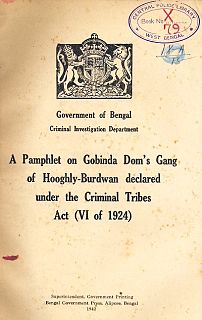 W
WThe Baroda Crisis was a political crisis took place in British India between 1872 and 1876 in Baroda, a 21-gun-salute Gujarati princely state.
 W
WThe Bihar famine of 1873–1874 was a famine in British India that followed a drought in the province of Bihar, the neighboring provinces of Bengal, the North-Western Provinces and Oudh. It affected an area of 140,000 square kilometres (54,000 sq mi) and a population of 21.5 million. The relief effort—organized by Sir Richard Temple, the newly appointed Lieutenant-Governor of Bengal—was one of the success stories of the famine relief in British India; there was little or no mortality during the famine.
 W
WVarious pieces of legislation in India during British rule since the 1870s were collectively called the Criminal Tribes Act (CTA). They criminalized entire communities by designating them as habitual criminals. Under these acts, ethnic or social communities in India which were defined as "addicted to the systematic commission of non-bailable offences" such as thefts, were systematically registered by the government. Since they were described as "habitually criminal", restrictions on their movements were also imposed. Adult male members of such groups were forced to report weekly to the local police.
 W
WThe Great Famine of 1876–1878 was a famine in India under Crown rule. It began in 1876 after an intense drought resulting in crop failure in the Deccan Plateau. It affected south and northwestern India—the British-administered presidencies of Madras and Bombay, and the princely states of Mysore and Hyderabad—for a period of two years. In 1877 famine came to affect regions northward, including parts of the Central Provinces and the North-Western Provinces, and a small area in the Punjab. The famine ultimately affected an area of 670,000 square kilometres (257,000 sq mi) and caused distress to a population totalling 58,500,000. The excess mortality in the famine has been estimated in a range whose low end is 5.6 million human fatalities, high end 9.6 million fatalities, and a careful modern demographic estimate 8.2 million fatalities. The famine is also known as the Southern India famine of 1876–1878 and the Madras famine of 1877.
 W
WThe British Indian Army Lushai Expedition of 1871 to 1872 was a punitive incursion under the command of Generals Brownlow and Bourchier. The objectives of the expedition were to rescue British subjects who had been captured by the Lushais in raids into Assam—including a six-year-old girl called Mary Winchester—and to convince the hill tribes of the region that they had nothing to gain and everything to lose by placing themselves in a hostile position towards the British Government.
 W
WEdward Robert Lytton Bulwer-Lytton, 1st Earl of Lytton, was an English statesman, Conservative politician, and poet. He served as Viceroy of India between 1876 and 1880—during his tenure Queen Victoria was proclaimed Empress of India—and as British Ambassador to France from 1887 to 1891.
 W
WRichard Southwell Bourke, 6th Earl of Mayo,, styled Lord Naas between 1842 and 1867, called Lord Mayo in India, was a statesman, Viceroy of India and prominent member of the British Conservative Party from Dublin, Ireland.
 W
WThomas George Baring, 1st Earl of Northbrook, was a British Liberal statesman. Gladstone appointed him Viceroy of India 1872–1876. His major accomplishments came as an energetic reformer who was dedicated to upgrading the quality of government in the British Raj. He began large scale famine relief, reduced taxes, and overcame bureaucratic obstacles in an effort to reduce both starvation and widespread social unrest. He served as First Lord of the Admiralty between 1880 and 1885.
 W
WThe Second Anglo-Afghan War was a military conflict fought between the British Raj and the Emirate of Afghanistan from 1878 to 1880, when the latter was ruled by Sher Ali Khan of the Barakzai dynasty, the son of former Emir Dost Mohammad Khan. The war was part of the Great Game between the British and Russian empires.
 W
WThe Treaty of Gandamak was signed on 26 May 1879 to officially end the first phase of the Second Anglo-Afghan War. Under the treaty, the Afghan Emir, Mohammad Yaqub Khan, ceded various frontier areas to the British Raj, including Quetta, Pishin, Harnai, Sibi, Kurram, and Khyber, while retaining sovereignty over the rest of Afghanistan.